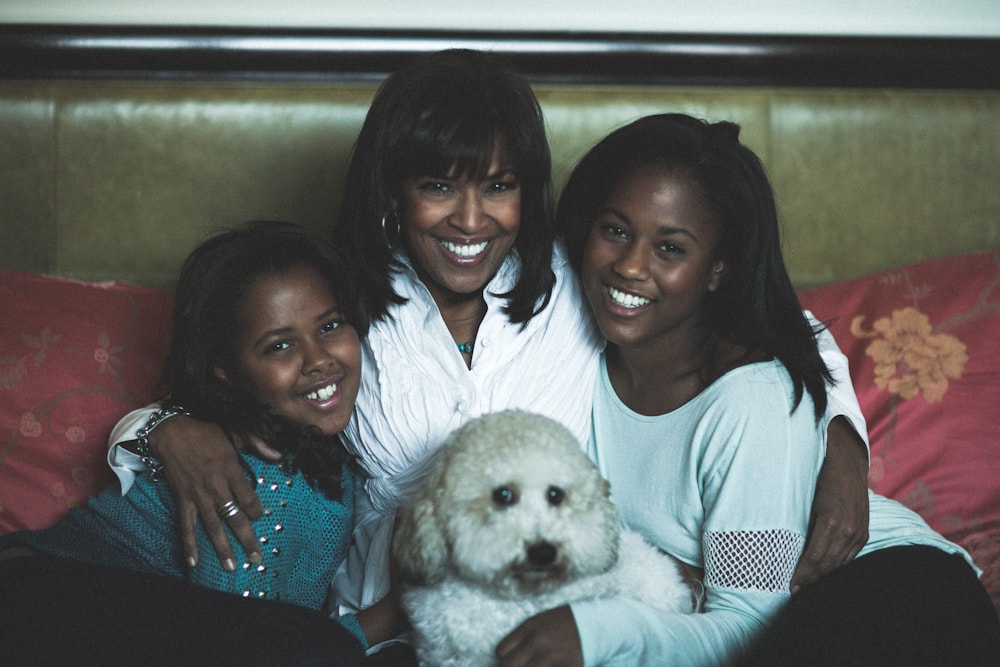Associate professor of fine art at Parsons The New School for Design, heralded artist with showings at the Whitney and MoMA, celebrated author, and—oh yeah —hands-on mother Coco Fusco, 52, has a lot on her plate. And while she makes the work-life-mom balance look easy, Fusco freely admits it’s anything but. Fusco talks with mater mea about whether or not women can really have it all at her son Aurelio’s seventh birthday party.
It seems like once or twice a year the Internet experiences a gender studies firestorm in the form of a lengthy article asking a seemingly simple question: Can women really have it all? On a bright June afternoon in a Clinton Hill neighborhood park, Coco Fusco—performance artist and an associate professor of Fine Arts at Parsons The New School for Design—is just one of the sea of moms juggling the child portion of “it all” that day.
Her son Aurelio bounces from wooden table to table, eagerly awaiting his friends’ arrival at his seventh birthday party, as Coco Fusco cuts slices of watermelon and opens up 12-packs of bottled water to keep the expected 15-20 parents and kids cool in the blazing sun. There are balloons to blow up, battling birthday parties to keep at bay and last-minute errands to run.
“We’ve been planning this and talking about what we’re going to do…”
“For five years!” Aurelio crows, watching his mother arrange watermelon slices on a plate.

It would be easy—comforting almost—to say that Coco Fusco is an example of a woman who has it all. Healthy and happy son? Check. A high-power position in her field of choice? Check. But ask Fusco what she thinks, if she really believes women can have it all, and the professor lays it all out there.
“People get really defensive about it, but I actually think she’s right,” Fusco says, referencing the latest addition to the conversation, The Atlantic’s July 2012 feature “Why Women Still Can’t Have It All.” (The article was written by Anne-Marie Slaughter, a woman who left her powerful history-making job at the U.S. State Department to be with her family when her teenaged son began acting out.)
“I’m not going to tell you it’s easy,” Fusco says. “This has been the hardest thing I’ve ever done in my life.”

Coco Fusco, 52, adopted Aurelio when she was 45 years old, after spending a good chunk of her life devoted to higher education—she has a Masters from Stanford and a Ph.D from Middlesex University—and her art, a mix of performance and video installation pieces that look at concepts as varied as language, race, and how human beings interact or exist online and in public spaces.
“I imagined myself having children at some point in my life from when I was very young, but I also had a very strong desire to finish my education and develop myself professionally,” Fusco explains. “I didn’t want to stop doing that in order to have children.
“I’m not the most conventional person in the world,” she continues. “I just didn’t see myself in a traditional marriage scenario. When I was about 40 or so, I thought ‘Ok, I guess I better put some serious effort into the child thing.’”
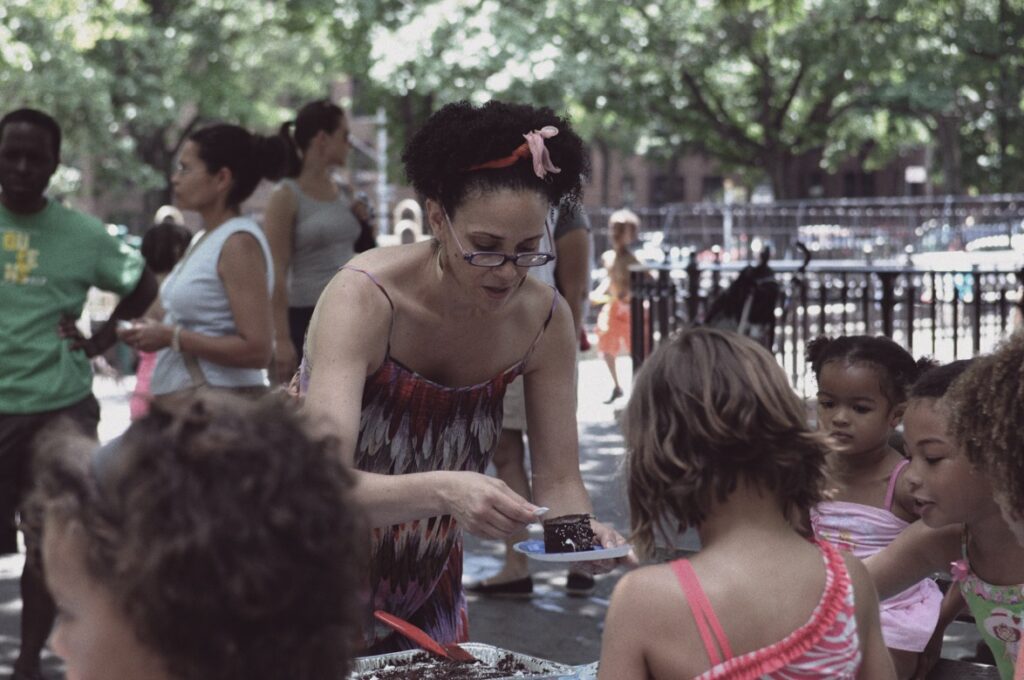
Coco Fusco contacted New York’s and went through a rigorous vetting process for a year to ensure she was both a good potential candidate and ready to be a mom. “You really have to look at yourself very carefully and understand what’s involved and what the particular challenges are before you can begin to make yourself available as a candidate,” Fusco says.
After a few meetings with Aurelio’s biological mother, Fusco got word that her son would be going home with her—in two weeks.
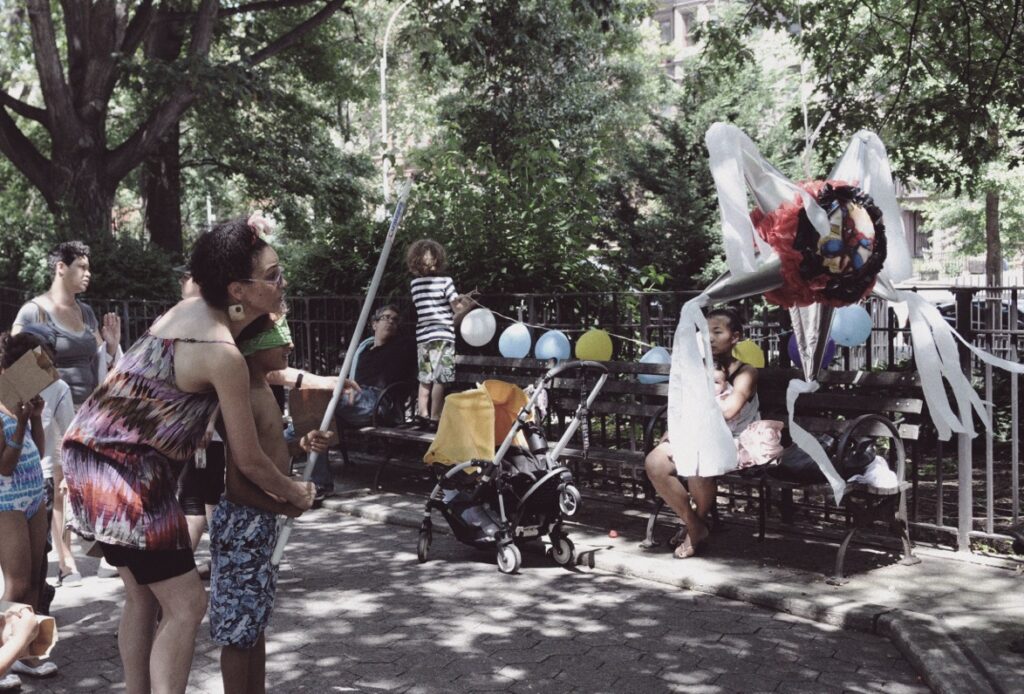
“I got the call right before I was going to a video shoot and I was like, ‘Oh my God,’” Fusco says, laughing, “‘Can I just have one more weekend?’ Women who get pregnant have months to prepare and I had two weeks.”
Despite the frenzy around jumping from working woman to working mom in 14 days, Aurelio’s arrival in the summer of 2005 was “a beautiful encounter,” Fusco says. “I was really lucky.”
While friends warned her that the first three years would be the hardest part of mothering, Coco Fusco felt the complete opposite, thanks to a year off from work for a sabbatical and maternity leave. Mother and son traveled around the world that first year, and “even though he was physically needy, it was really easy to care for him,” Fusco says. “He could adapt to anything that I had imposed. I put him a stroller, he would go to sleep. I would feed him anywhere, change him anywhere. I even gave lectures while holding him on a hip.
“We were able to spend a lot of time together and bond,” she says.

But the maternal bliss bubble soon burst when Coco Fusco had to go back to work. “Beyond maternity leave, you get no love at work” for being a parent, she says. Juggling her workload and the myriad meetings, lectures and after-hours events required of a career in academics can be incredibly difficult, Fusco says, especially since “the hours of day care are not the same as academic work hours.
“I do psychological damage to my son if I’m absent for too long,” Fusco says. “I’m a single mother. I can’t always leave him with someone else, because it’s really bad for him. Kids know and feel the difference between being cared for by family or by others and fear of abandonment is a real issue.”
Making sure things are working at school is key to keeping the Fusco household running. “If things fall apart in the school scenario, my whole life goes,” Fusco explains. “Because if he can’t be at school, I can’t be at work.”

The pursuit of a good education is something every parent in New York is familiar with—but add “affordable,” “convenient” and “diverse” into the mix and the search can become another full-time job in itself. Aurelio’s pre-kindergarten at The Dillon Child Study Center—a part of St. Joseph’s College—was costly and ended too early (at 2:30, when this working mom was still, well, working). P.S. 8, his first public school and where he attended kindergarten, was not very ethnically diverse and the teaching focused heavily on memorization, his mother says.
“When he was in Pre-K, my hair was falling out from anxiety about how to get him into a decent [kindergarten] because most of the public schools in this zone are pretty bad,” Coco Fusco recalls. “I was down at the Department of Education when he was 4 every other week, because I was told by other parents [that] if you make yourself known eventually you will get what you want. When he was in kindergarten at P.S. 8 he rebelled against it and was crying about going to school.”

Luckily enough Aurelio landed a spot at the Brooklyn New School in its annual lottery, getting off the school’s waitlist in the first grade. New School turned out to be just right for her creative and energetic son.
“It’s an alternative, progressive school with a play-based curriculum,” Coco Fusco explains. “I knew this [was] going to be the right place for him. It’s really the most diverse educational atmosphere I’ve seen in a school in Brooklyn and I’ve toured at least 15 schools.”

“Momma,” Aurelio suddenly runs up and grabs his mother’s waist, all long, skinny legs and arms. His pointer finger zig-zags in the air. “Listen to what I did: I slipped through, I came around, I went that way!”
“Very good!” Coco Fusco says as he dashes back across the playground, avoiding water fights and toddling babies.
It may be the hardest thing she’s ever done, but moments like this—a son excited for what the day holds, the calm before a child’s party descends on four boxes of pizza and watermelon slices—are things to be cherished.
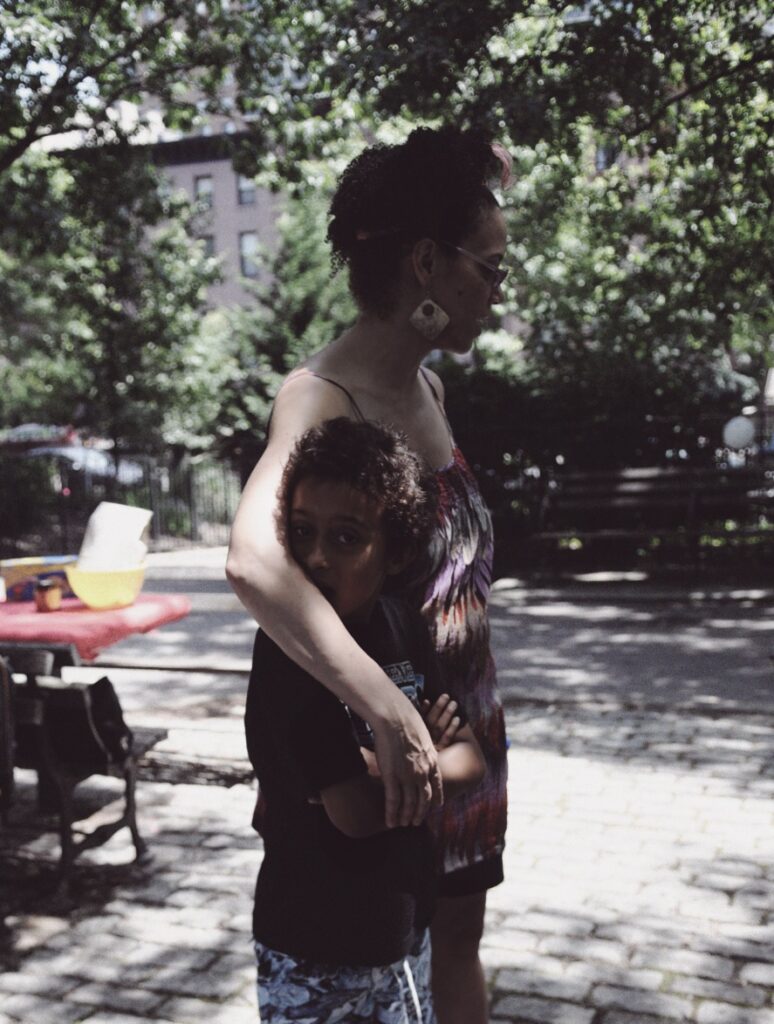
Q&A
WHAT ARE YOUR SUMMERTIME PLANS?
First, we are taking a trip together to Chiapas, [Mexico] for a couple of weeks. Then when we get back I need to work so Aurelio is going to summer camp at Long Island University’s Children’s Academy.
It’s not academic, but it’s structured and the groups are small. So the children take classes in chess, computer game design, the photography, filmmaking and puppetry. They also have time for swimming and game time.

HOW WOULD YOU DESCRIBE YOUR SON’S PERSONALITY?
He’s a very imaginative kid. He spends hours building little worlds at home or drawing. He goes to Pratt Saturday School during the school year and spends two hours in classes drawing and learning other basic art skills such as printmaking and collage. He really enjoys those classes. He’s very social—he likes his buddies. He loves to be read to. He’s very curious. He’s very interested in animals and we spend a lot of time in zoos and natural history museums.
He’s a very strong-willed boy. He’s very feisty. He was the toddler who bit other kids, who hit too much, who got into fights. He has a lot of aggressive energy…so we’re trying to learn how to channel that.
WHAT PARTS OF YOU DO YOU SEE IN HIM?
FUSCO:He’s kind of an independent spirit. A free thinker. He’s very interested in stories and storytelling. Travelling is very important to me and he’s come along on many trips. He’s been to Russia, Argentina, all over Europe, Mexico and Cuba…
AURELIO:The North Pole!
F:We weren’t at the North Pole, but we were way up at the border of Norway and Russia when he was a baby. So he has a view of the world that is shaped by lots of exposure to different people and places.

WHERE DID THE NAME AURELIO COME FROM?
F:In my family we have Arturos, Albertos, and an Attilio—lots of names beginning with A, right? And I didn’t want to name him after another family member. In Gabriel Garcia Marquez’s “One Hundred Years of Solitude” the main character is Aureliano Buendia. That’s where I got the idea to name him Aurelio. The Latin version is Aurelius, like Marcus Aurelius, the Roman emperor and philosopher.
A:That means I’m a famous emperor!

HOW DO YOU FIND YOUR BALANCE?
Over time, it’s gotten harder because he’s become more complicated as a person with a broader range of needs. He is more aware and more insistent. He wants me to be around, to take him places, to attend special events at school, to accompany his class on trips. If I have to leave town for a couple of days for work, he gets upset.
Childcare is a big challenge. Last year I started to work with au pairs. It took me awhile to figure out how to make the arrangement work, but this year we’ve had a good situation with Gerardo. He helps me with Aurelio after school, so that means if I have to teach late I can. It also means that I can come home for dinner, see Aurelio before he goes to bed, and then go out again to a meeting, or to run errands or go to the gym. Having an au pair is also expensive but there are advantages such as flexible hours and availability at times when freelancers don’t work.
But basically I don’t have a dime at the end of the month. I can cover food and the expense of childcare, and that’s it. And I’m always thinking about what else I can let go of. This is a very unforgiving city in that the cost of raising children is outrageously high.
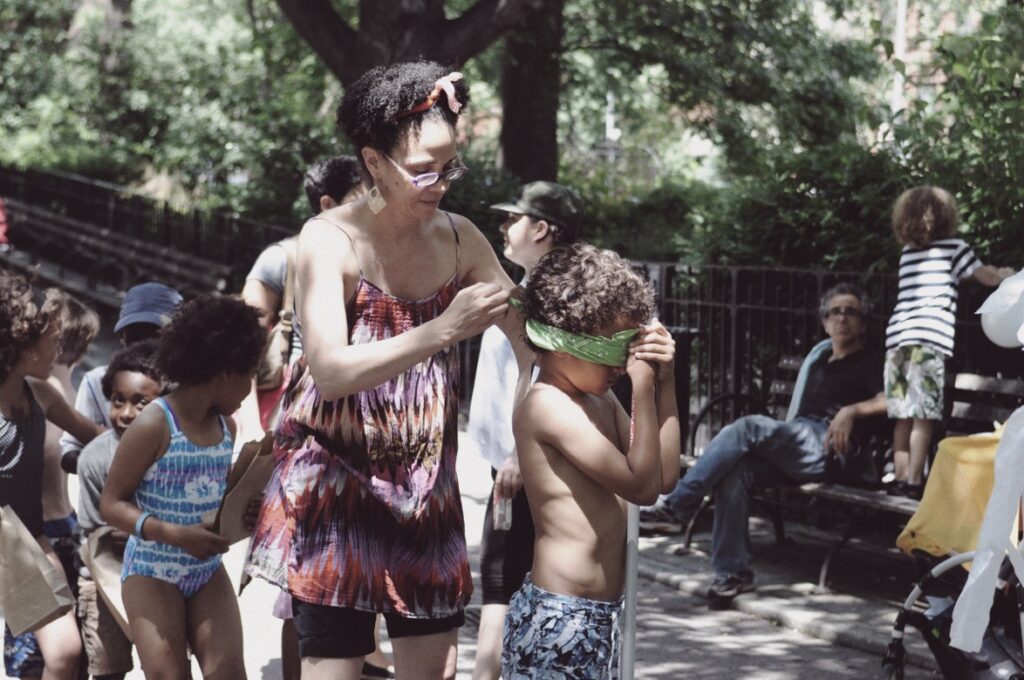
WHAT IS THE BEST PARENTING ADVICE YOU RECEIVED FROM THE MOTHERS IN YOUR LIFE?
My mother was already quite elderly when Aurelio appeared on the scene. Her health wasn’t so good, so she couldn’t really be that involved with his care when he was little. But I do get good advice from other relatives, particularly cousins and aunts who have been teachers as well as mothers.
I think a lot of mainstream media about parenting is complete nonsense. It’s just emotional fluff, designed for pregnant women dreaming about what it’s like to have children. It has nothing to do with the day-to-day challenges and joys and troubles of taking care of children.
Parenting goes way beyond trying to turn your kids into geniuses with special classes. It is much more than getting your kid into the best public school. Sometimes it is about survival, [about] figuring out the most effective ways to socialize another human being and taking care of oneself at the same time.
I quickly found out within the few months of having Aurelio with me that I didn’t need 99% of what parenting advice columns and magazines said I needed. I didn’t need most of the toys, I didn’t need any of the fancy clothes, I didn’t need all the crazily expensive organic foods. I didn’t need any of that. I need time with my son. I need to give him my attention, I need to care about really important things in his life, I need to protect him from bad situations.

DO YOU HAVE A LARGE FAMILY?
My family is getting smaller. Both of my parents are deceased. I have two brothers. One of my brothers was killed in the 80s—he was in the military. My other brother is here but he doesn’t have children.
Aurelio has a community of people he sees regularly here: friends he’s had, some of them from daycare, some of them are children of friends of mine. We try to keep some sense of community by keeping good relations with the people he’s known for a long time to help him feel more sort of centered. His godfather is also very important for him.
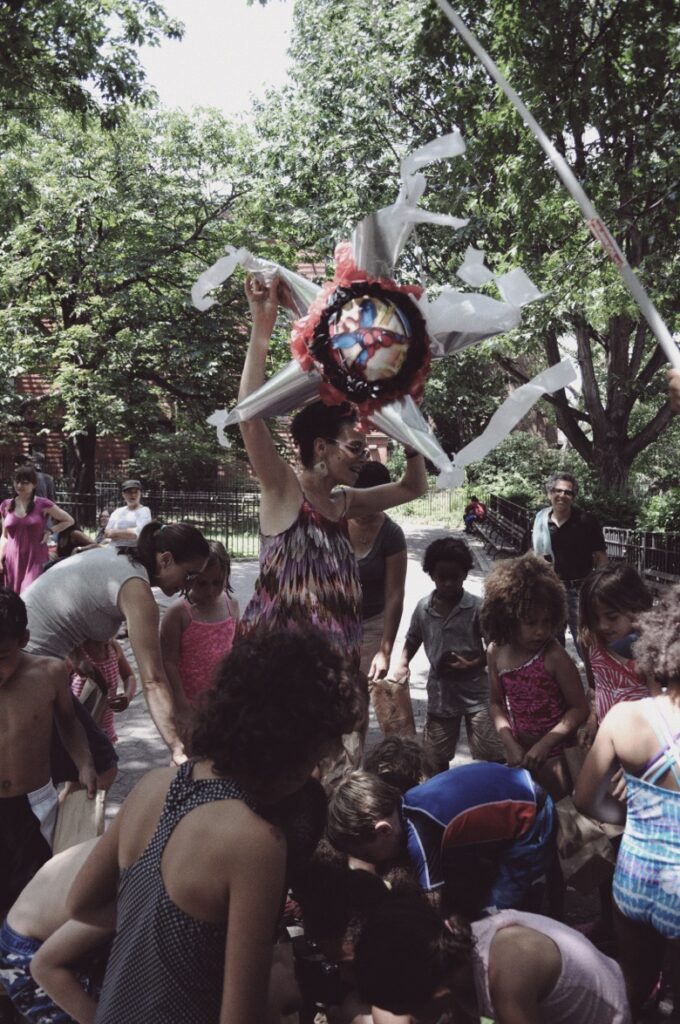
WHAT DO YOU LIKE TO DO FOR FUN TOGETHER?
F: He’s really good at swimming. He took capoeira classes this past year. And he likes drawing a lot. You also like to play some computer games, like Angry Birds.
A: I’ve played all the levels and I did Angry Birds Space and it’s so easy. And the next one is super fun because there’s lots of monkeys.
F: I’m a big table games kind of person for hanging out so we do a lot of that. We play card games like War and Go Fish and also checkers, Chinese Checkers and Junior Scrabble. We do a lot of reading together…
A: Because my mom forces me!
F:(Sarcastically) You really suffered. I mean, I think you’re so upset about it.
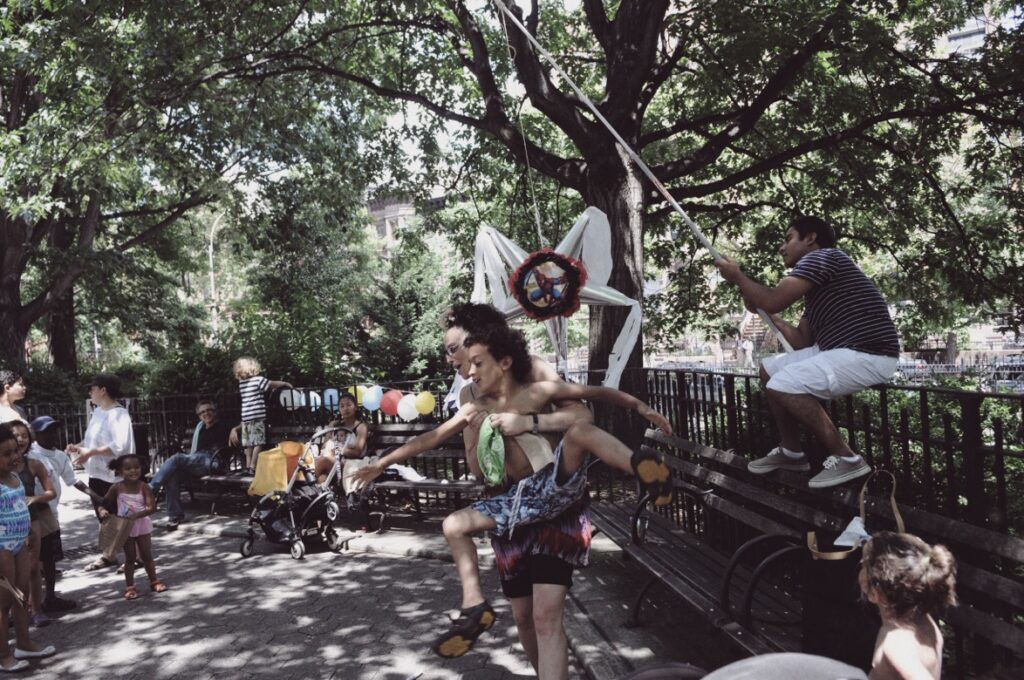
WHAT KIND OF MAN DO YOU HOPE YOUR SON BECOMES?
I want him to be a thoughtful person and a caring person, a moral and an ethical person who understands right and wrong and wants to do good in the world and treat people well. I also want him to be a person who’s happy with himself, who accepts himself as he is and accepts others as well. I think that’s really important. I don’t want him to be narrow minded; I want him to be an open-minded person. You know, we talk a lot about these kinds of things and I try to find ways to talk that he will understand.

WHAT’S YOUR FAVORITE THING ABOUT BEING MOM?
I think it’s to see him grow and become his own person. [It] is really fascinating.





